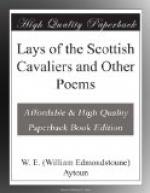Mr. Skrine, his apothecary. We found his senses
clear, and his mind calm: his nurse and several
servants were about him. He told us he had sent
for us to give him an account of an odd sensation
he had for some time observed and felt in himself;
which was, that, by composing himself, he could
die or expire when he pleased; and yet by an effort,
or somehow, he could come to life again, which he had
sometimes tried before he had sent for us. We
heard this with surprise; but, as it was not to be
accounted for upon common principles, we could hardly
believe the fact as he related it, much less give any
account of it; unless he should please to make the
experiment before us, which we were unwilling he should
do, lest, in his weak condition, he might carry it
too far. He continued to talk very distinctly
and sensibly above a quarter of an hour about this
surprising sensation, and insisted so much on our
seeing the trial made, that we were at last forced
to comply. We all three felt his pulse first—it
was distinct, though small and thready, and his heart
had its usual beating. He composed himself on
his back, and lay in a still posture for some time:
while I held his right hand, Dr. Baynard laid his
hand on his heart, and Mr. Skrine held a clean looking-glass
to his mouth. I found his pulse sink gradually,
till at last I could not find any by the most exact
and nice touch. Dr. Baynard could not feel the
least motion in his heart, nor Mr. Skrine the least
soil of breath on the bright mirror he held to his
mouth; then each of us by turns examined his arm,
heart, and breath, but could not, by the nicest scrutiny,
discover the least symptom of life in him. We
reasoned a long time about this odd appearance as well
as we could, and all of us judging it inexplicable
and unaccountable; and, finding he still continued
in that condition, we began to conclude that he had
indeed carried the experiment too far; and at last
were satisfied he was actually dead, and were just
ready to leave him. This continued about half
an hour. As we were going away, we observed some
motion about the body; and, upon examination, found
his pulse and the motion of his heart gradually returning.
He began to breathe gently and speak softly. We
were all astonished to the last degree at this unexpected
change; and, after some further conversation with
him, and among ourselves, went away fully satisfied
as to all the particulars of this fact, but confounded
and puzzled, and not able to form any rational scheme
that might account for it.”
HERMOTIMUS
I.
“Wilt not lay thee down in quiet
slumber?
Weary dost thou seem, and
ill at rest;
Sleep will bring thee dreams in starry
number—
Let him come to thee and be
thy guest.
Midnight
now is past—
Husband!
come at last—
Lay thy throbbing head upon
my breast.”
II.




